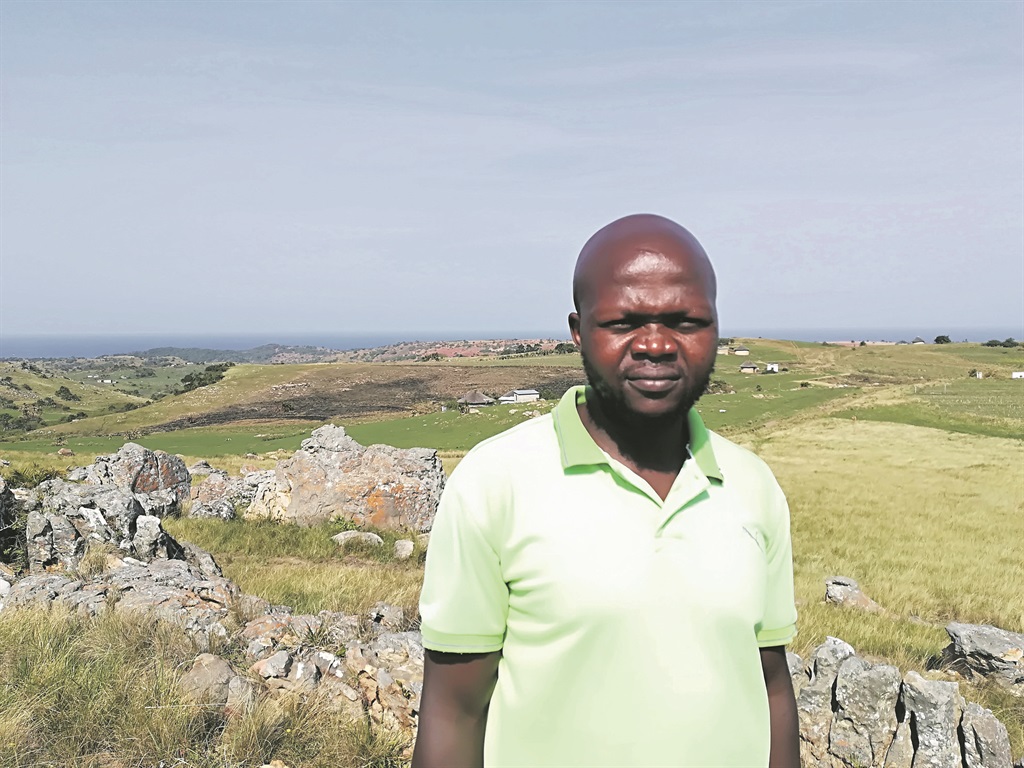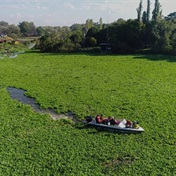
It gets colder as one approaches Xolobeni in the Eastern Cape. But on the 76km trip southeast of Mbizana towards the KwaZulu-Natal border, drivers are instead bracing themselves for the deteriorating roads.
Near old caves that lie above a spectacular stream, the peace is palpable in Xolobeni, with its banana trees and verdant vegetable gardens. The wind blows more strongly as the road disappears, forcing one to drive on makeshift tracks and across small bridges, where making it to the other side is not guaranteed.
Xolobeni’s peace belies its people, who are so opposed to titanium mining in the red dunes behind their homes that they have waged a more than 10-year campaign to fend off an Australian company that wants to establish operations there.
Last weekend, the Amadiba Crisis Committee (ACC) again managed to thrust their plight into the national spotlight by protesting outside a meeting between pro-mining residents and Mineral Resources Minister Gwede Mantashe, which ended with the police firing tear gas and their lawyer, Richard Spoor, getting arrested.
Although they have little, Xolobeni residents refuse to be labelled as “poor”. They believe government is punishing them and denying them essential services to force them to relent and agree to the mine.
In Mtentu village, residents get their water from the river. There are no roads, no electricity and no clinic. The nearest high school is 15km away. Still, they will not back down, saying the dunes are
their heritage, and they would rather die than allow mining company Mineral Commodities to destroy them.
ACC chairperson Sibusiso Mqadi said he and his neighbours “feel like we do not belong in South Africa”.
“We are like an island. If you were to look at other places, including in rural areas around the country, you will see there is development. In other places, they have electricity, water, roads, schools and basic healthcare, but they don’t have mining. We don’t understand why we have to agree to mining just so that we can get these basic services,” he said.
Mqadi (33) has been protesting the proposed mine for 15 years – seven of which as a full-time activist. Although he has no proof, he insists that only 2% of his area’s residents support mining.
In the pervasive climate of fear, few contradict him. Village chief Lunga Baleni, who wants the mine, is not home and doesn’t answer his phone when City Press calls.
Mqadi insists mining won’t benefit the people of Xolobeni, who have neither the education nor the skill to work in mining operations. He says mining will destroy the environment and their way of life.
“We live peacefully here. We are happy and we don’t need outsiders to tell us that we are poor and that we need mining to change our lives. That is all propaganda. We are not poor. Not a single person here in Xolobeni goes to bed hungry,” Mqadi said.
“We live off the sea and, once they start mining, we won’t have access to the sea because they are going to take us out of that area and demarcate it for mining. At the moment, we are able to get fish from the sea, and other things such as crayfish and mussels.
“We also plant vegetables in this beautiful and fertile soil of ours. Indigenous amadumbe, mealies and beans are things we grow ourselves. We are happy with our way of life and feel it is an insult to suggest that we are poor.”
Mqadi, a former tour guide, insists tourism and agriculture are better alternatives if government actually wants to support them.
“This is our land, our heritage. We have fought for many years and some have lost their lives along the way. There is no way we can ever agree to this exploitation. They would have to kill us first,” he said.
But Zamile Qunya, a prominent pro-mining activist, tells a different story.
“Those who support mining are in the majority. It is just that we are not as vocal in the media as they are. They are funded by social and environmental movements from abroad to push
this propaganda that people don’t want mining,” he told City Press by phone.
“Mining will happen whether they like or not. They said the N2 Wild Coast toll road would not happen, that they would rather die than see it happen. It is happening as we speak. It is going
to happen.
“It is God who put that mineral there because He saw the poverty in the area. He put something so that they can live and benefit. Mining is going to happen in my lifetime and even those opposed to it will see it with their own eyes. The only way anyone can stop it is if they bomb out the mineral in Xolobeni.”
In 2016, anti-mining activist Sikhosiphi “Bazooka” Radebe was gunned down in what the ACC believed was a hit. Others have been injured during violent confrontations between pro- and anti-mining activists. The home of Duduzile Baleni, headwoman at Umgungundlovu Great Place in Xolobeni, who sided with mining opponents, was attacked and she was forced to flee the area.
Although Qunya says it’s mostly young people who are against the mine, Magusheni Mandondo (85) begs to differ: “I was born on this land. We never said we wanted mining and we never said we are poor, and no one must decide for us that we are poor. We don’t need their jobs if they come through mining,” he said.
“It is not correct for other people to sit somewhere in a corner and decide on behalf of the indigenous people of Xolobeni what should be done with their land. This is the land of our forefathers, and we are going to fight for it for the benefit of our own children and their offspring. If government wants to help us, it can help us by staying away from our land.”
Mapiyose Tuli (46), a mother of five, grows amadumbe and other vegetables, which she sells in town.
“Whatever is beneath our soil is our heritage and we are proud of it and we have a right to say no,” she said, insisting that mining would contaminate water in the area and lead to diseases, not development.
Bhekeni Danca (38) from Khwanyana village has been at the forefront of the fight against mining for the past decade.
“We do not have any services here, so our government already does not care for us. Why should we accept mining when nobody thinks we are worthy of anything? There is no water here, so if we agree to the mine, they would pollute the very small water resource we have,” she said.
Khwanyana village has neither electricity nor a single tap. The only thing government has provided are pit latrines. Clinics, schools and other amenities are only available in neighbouring villages.
But pro-mining activist Ntethelelo Madikizela insists the mine will bring huge infrastructure development to the area, including roads, water, electricity, schools and clinics. Most crucially, it promises jobs.
“This project will bring plenty of opportunities in this place and help us fight poverty,” he told City Press in an earlier interview.
“We, the people of Xolobeni, are determined to bring mining to this area, and we are also prepared to die to realise that dream. We are not scared of their intimidation.”
Eastern Cape government spokesperson Sonwabo Mbananga denies that government is depriving Xolobeni residents of basic services to force them to agree to the mine, saying it would be criminal
to do so and that the allegation was “not supported by facts”.
“What I can say is that the position of provincial government is that we want and welcome development that can create jobs and, of course, increase the economic activity in that part of the province,” he said.
“But, again, the provincial government is of the view that one should not push on with that without arriving at a stage where there is sufficient consensus from both sides on the way forward.”
Government, he said, was not opposed to the proposed titanium mine, but it couldn’t take place at the residents’ expense.
“Any mining that takes places there, if it does, should be environmentally responsible and take due care. And whoever mines there should provide a post-operation rehabilitation plan for the environment,” he said.
SMS us on 35697 using the keyword XOLOBENI and tell us what you think. Please include your name and province. SMSes cost R1.50. By participating, you agree to receive occasional marketing material
 |
| ||||||||||||
| |||||||||||||




 Publications
Publications
 Partners
Partners










